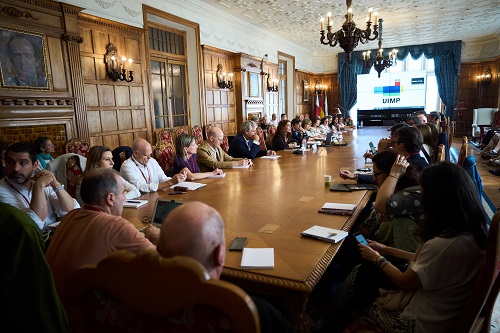
Manuel G. Penedo, director of CITIC, attends as a speaker at the course organized by the Carlos III Health Institute and the Menéndez Pelayo International University
A Coruña, 28th June 2024.- Manuel G. Penedo, director of CITIC at the University of A Coruña (UDC), participated as a speaker in the summer course “Advances in Biomedical and Health Research. Meeting of Health Research Institutes,” organized by the Carlos III Health Institute (ISCIII) and the Menéndez Pelayo International University (UIMP) in Santander.
During the meeting, which began on Thursday, the 27th at the Magdalena Palace, an analysis of the state of biomedical research was presented, and a discussion forum was created with the participation of healthcare professionals and researchers.
Manuel G. Penedo, a specialist in Computer Science and Artificial Intelligence, took part in the round table “New European Regulatory Framework for AI: Impact on Research,” offering his perspective on the application and advances brought by this technology in the medical sector. His presentation began with a review of the history of Artificial Intelligence leading up to its applicability in healthcare. The current challenges, he noted, are related to increased computational capacity, interconnectivity, data use and analysis, and the training and retention of talent.
For future challenges, the UDC professor highlighted the need for transparency; sustainability in terms of the resources needed for model training; and ethical research to avoid biases. He connected these aspects with the recently approved European legislation, the first of its kind worldwide to establish a framework for the responsible development and use of AI. Manuel Penedo stated that one of the roles of the Spanish Agency for the Supervision of Artificial Intelligence (AESIA) will be to implement European regulations at the national level. In his own words: “We have the responsibility to ensure that AI is respectful, ethical, and sustainable.”
CITIC has positioned itself as a reference center in the healthcare sector, strengthening the development of ICT in areas such as assistive technology, chemoinformatics for drug discovery, and personalized medicine.
This session also featured a presentation by Gisela Sugranyes Ernest, a researcher at the August Pi i Sunyer Biomedical Research Institute (IIS IDIBAPS) in Barcelona. It was moderated by Natalia Cal Purriños, Director of Management at the Navarra Institute for Health Research (IIS IdiSNA).
Throughout the course, which concludes today, four sessions were organized to analyze the current state of biomedical research, as well as its challenges, opportunities, and the ethical aspects of research, with participation from the Spanish Bioethics Committee.





